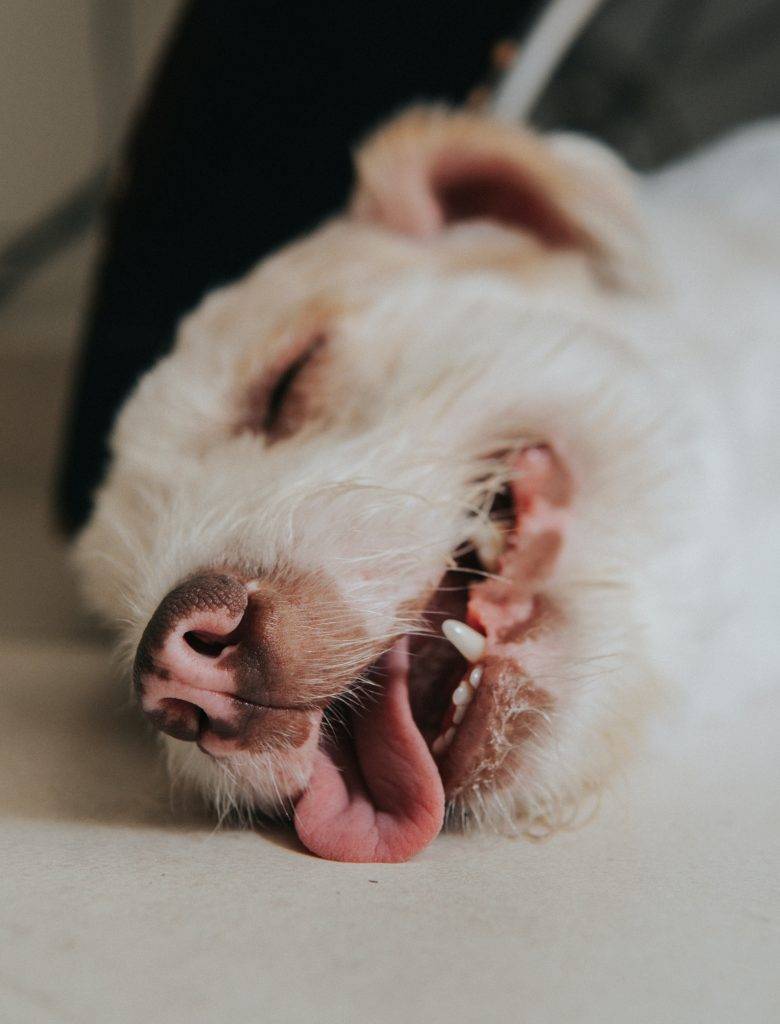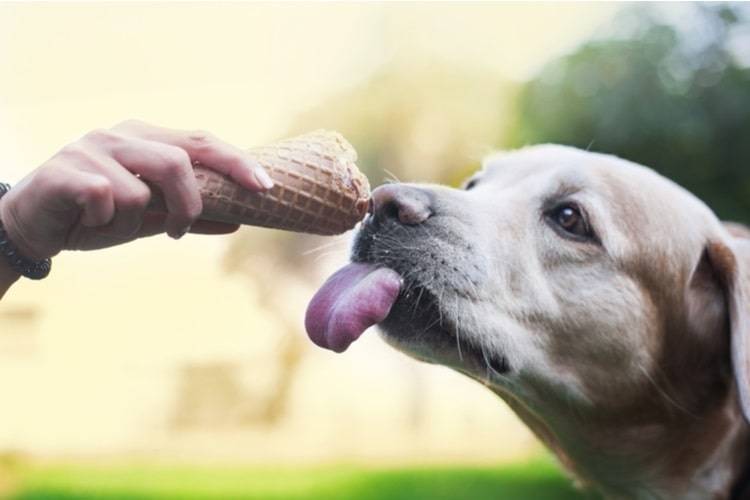We all know that our canine companions are not exactly great at sleeping in general. You try to put them down and they’ll only get so far before getting up again. And even if you manage to get them on the bed, it’s pretty much guaranteed that they won’t stay there for long.
But what about our pets’ strange sleeping habits? You might be wondering why your dog is sleeping with tongue out? Why do some dogs stretch their mouths wide open while sleeping? This can lead to an unusual condition called “hanging tongue syndrome” which affects both puppies and adult dogs alike. If your pet has this problem, don’t worry — we’re here to help!

Why Does My Dog Sleep With His Tongue Out?
This one is easy. The main reason why dogs sleep with their mouth open is because of something known as “sleep grooming.” In order to groom themselves properly during these precious few hours each night, dogs need access to water. But since it’s difficult for them to lick themselves due to being unable to close their jaws, they resort to using other means such as scratching themselves against trees or walls. When they do this, they often end up licking away dirt particles from their fur, along with bugs or parasites lying dormant within. To make matters worse, this also exposes them to dangerous bacteria like E Coli. By doing this, they may cause harm by accidentally swallowing harmful dust.
Another possible explanation comes from veterinary medicine. Some vets argue that hanging tongue occurs due to missing teeth in the upper jaw (as well as lower). These animals would simply feel uncomfortable chewing food without having any proper way to process it. They, therefore, use their tongue more frequently than usual, either to clean themselves or eat unchewed pieces of food. However, research suggests that dental problems aren’t responsible for this behavior. Instead, it might actually come from the oral cavity itself. There are two different theories regarding how this happens. One says that it’s caused by dryness, while another claims that it’s related to abnormal muscle function. What is clear though, is that this shouldn’t happen unless certain conditions are met. For example, dogs who suffer from neurological issues should avoid prolonged periods of sleeping with their mouths opened. Also, those whose diets lack essential nutrients will experience similar symptoms.
A Couple of Teeth Missing
If your dog doesn’t seem to have any medical issue causing its tongue to hang out, then your vet might suggest removing anything obstructing its mouth. A couple of things can cause this. One of them involves tooth loss. As was mentioned earlier, this commonly happens following severe gum disease. Another possibility is that a puppy lost its deciduous teeth prior to growing into adulthood. Adult dogs tend to lose their permanent teeth after reaching full growth usually around 10 years old.
In addition to tooth loss, various infections can result in a gaping maw too. Salivary cysts, abscesses, tumors, cancerous lesions, etc., can all cause such an occurrence. Other causes include foreign bodies blocking the airway, injury, trauma, infection, inflammation, and congenital abnormalities.
What is Hanging Tongue Syndrome?
Hanging tongue syndrome refers to a number of signs including excessive drooling, enlarged salivation glands, difficulty breathing through the nose, snoring, regurgitation of saliva, nasal discharge, vomiting, coughing, and sneezing. Sometimes, it can also cause serious complications. Since it makes it hard for dogs to breathe normally, sufferers can run the risk of dying from hypercapnia. Hyperventilation can also occur leading to hypoventilation and respiratory arrest. On top of that, dehydration may develop due to frequent regurgitation of fluid back into the throat. Furthermore, laryngeal collapse can sometimes take place as well. Larynx basically refers to the voice box located at the bottom part of the neck. During hyperventilation, it can swell thus making speech impossible. Finally, aspiration pneumonia can affect them as well.
As previously discussed, this condition isn’t exclusive to dogs but rather common among many species of mammals. Most cats suffer from this problem too. So do humans, although it rarely leads to death. Cats typically deal with it differently compared to dogs. Usually, they inhale warm moist air through their nostrils instead of opening their mouths widely. Humans, however, tend to hold their breath until experiencing short bouts of apnea followed by loud snores. Scientists believe that this oddity stems from the fact that early man used to hunt prey by stealth. Thus, he needed to remain silent to ward off potential threats.
Unlike cats, dogs are vocal creatures. Therefore, when they sleep with their mouths open, they produce sounds louder than normal. Snoring is probably the most noticeable sign.
My Dog Has Its Tongue Out – Is That Hanging Tongue Syndrome?
Dogs suffering from this condition can easily recognize this symptom. While they can’t talk, they can still show discomfort upon hearing it. Fortunately, treatment options exist. Your vet is likely to prescribe medicines designed specifically for this purpose. At least twice daily doses of anti-inflammatory drugs like ibuprofen or diclofenac sodium might prove helpful. Be mindful though that these medications can be quite powerful. Hence, overuse can potentially trigger gastrointestinal bleeding, kidney damage, heart rhythm disturbances, etc.
You should consult with your veterinarian first if your dog seems to have developed this disorder. He/she may advise trying alternative methods like applying soothing agents directly onto the gums or feeding your pooch special treats containing probiotics.
Symptoms of Hanging Tongue Syndrome
The exact reasons behind this condition vary depending on the type of animal affected. Suffering from this affliction can range from mild to life-threatening. Here are several typical signs associated with it.
Snoring: Loud moaning coming from inside the mouth can indicate that your pup suffers from this ailment.
Protrusion of tongue: An extended length of the organ can give rise to this unpleasant sight.
Swelling: Due to excess moisture accumulation within the oral cavities, tissues become larger thereby increasing the size of salivary glands.
Excessive secretion: Saliva production tends to increase substantially resulting in copious amounts of mucus dripping from the corners of the mouth.
Drool: Excessive amount of liquid accumulates within the mouth eventually pooling towards the front of the palate.
Nosebleed: Signs indicating blood clotting within the nasal passage can start oozing from the nostrils.
Hyperventilation: Breathing becomes labored and shallow.
Discomfort: Painful feeling experienced by the patient indicates that something is wrong.
Breathing difficulties: Difficulty controlling breaths can mean trouble ahead.
Loss of consciousness: Severe cases can ultimately lead to an unconscious state.
Seizures: Brain swelling can induce seizure activity.
Needless to say, dogs who suffer from this condition need urgent attention. Seeking professional assistance right away is recommended. Veterinarians usually recommend giving your pet oxygen therapy and administering intravenous fluids. Even if your pet starts showing no improvement, they must be sent immediately to see a specialist.
It’s important to note that, unlike humans, dogs never stop producing saliva throughout their lives. Sipping water regularly helps keep this condition under control. Dry foods contain fewer calories and are less palatable compared to canned ones. Plus, they are harder to digest. Canines that are fed wet kibble constantly have higher levels of gastric acid. This can cause stomach ulcers later on. Lastly, overfeeding is not advisable for older dogs. Smaller portions work best for them.
Why Does My Dog Sleep With His Tongue Out? Causes Explained…
There is nothing more adorable than seeing your dog sleeping with the tongue out in their comfy sleeping space.
A healthy dog sticks their tongue out during sleep to regulate its body temperature.
Sometimes, there is no reason for the dog to sleep with his tongue out.
Don’t be alarmed if your dog is sleeping with its tongue out.
A Couple of Teeth Missing Many people want to know why my older dog sleeps with his tongue out.
Again, an old dog sleeping with tongue out is normal and nothing to worry about.
If you notice the dog sticking tongue out repeatedly right after introducing new drugs to their system, talk to a vet.
Why Does Your Dog Sleep With Her Tongue Out?
Do you ever look at your dog when she is sleeping and see her tongue hanging out? Do you ever wonder why she sleeps like this? Do you wonder if it’s normal?
By sticking some or all of the tongue out, contact with the air aids in the evaporation of saliva on it, which cools down the tongue and releases heat from the blood supply carried in the vessels.
As long as there’s no bleeding or injury to the tongue your dog and his tongue are behaving normally.
Hanging Tongue Syndrome is a condition where a dog’s tongue hangs out of his mouth all the time and the dog is unable to bring her tongue in at will.
Hanging tongue syndrome can become painful to the dog.
If the tongue is always hanging out of the mouth and is not getting the natural moisture from the mouth it can dry out and crack.
If your dog has Hanging Tongue Syndrome make sure your dog’s tongue does not become too dry or cracked.

